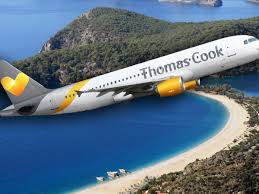
According to BBC, the UK Civil Aviation Authority (CAA) said the tour operator had “ceased trading with immediate effect”, so its four airlines would be grounded.
The company failed after it was unable to secure emergency funding.
The British government said the return of the 178-year-old firm’s 150,000 British customers now in vacation spots across the globe would be the largest repatriation in its peacetime history. The process began Monday and officials warned that delays are inevitable.
With the collapse of the holiday firm, its 21,000 employees in 16 countries, including 9,000 in the U.K., will lose their jobs. The company several months ago had blamed a slowdown in bookings because of Brexit uncertainty for contributing to its crushing debt burden.
The company had said last Friday it was seeking 200 million pounds ($250 million) to avoid going bust and was in weekend talks with shareholders and creditors to stave off failure. The firm, whose airliners were a familiar sight in many parts of the world, also operated around 600 U.K. travel stores.
The company’s chief executive, Peter Fankhauser, said in a statement read outside the company’s offices Monday morning that he deeply regreted the shutdown.
“Despite huge efforts over a number of months and further intense negotiations in recent days we have not been able to secure a deal to save our business. I know that this outcome will be devastating to many people and will cause a lot of anxiety, stress and disruption,” he said.
Britain’s CAA said it had arranged an aircraft fleet for the complex British repatriation effort, which is expected to last two weeks.
“Due to the significant scale of the situation, some disruption is inevitable, but the Civil Aviation Authority will endeavor to get people home as close as possible to their planned dates,” the aviation authority said in a statement.
Describing the repatriation plan, British Transport Secretary Grant Shapps said dozens of charter planes, from as far afield as Malaysia, had been hired to fly customers home free of charge. He said hundreds of people were staffing call centers and airport operations centers.
“The task is enormous, the biggest peacetime repatriation in U.K. history. So there are bound to be problems and delays,” he said.
British travel expert Simon Calder told Sky News that Thomas Cook’s problems started in 1994 when the “open skies” agreement allowed upstarts easyJet and Ryanair to flourish. At the same time, he said, the Internet became widely used for travel bookings, lessening the demand for Thomas Cook’s travel agencies.
“There’s still of course a place for travel professionals, there’s a place for the package already, as companies like Jet2 and TUI are demonstrating, but Thomas Cook was behind the curve and I’m afraid with high costs such as those expensive high street premises they simply couldn’t cope,” he said.






